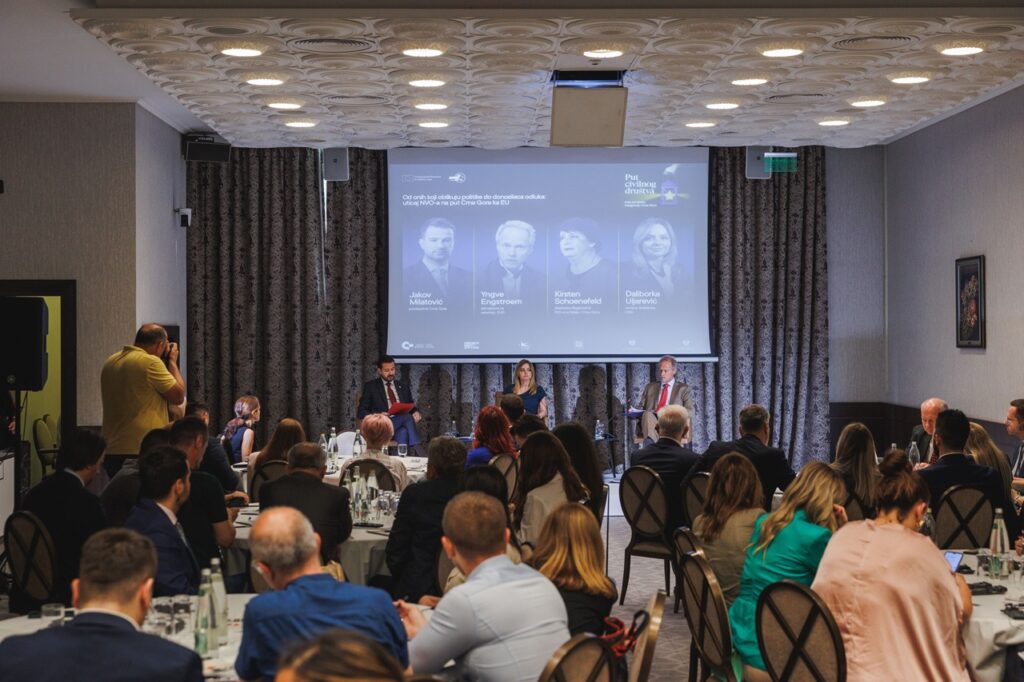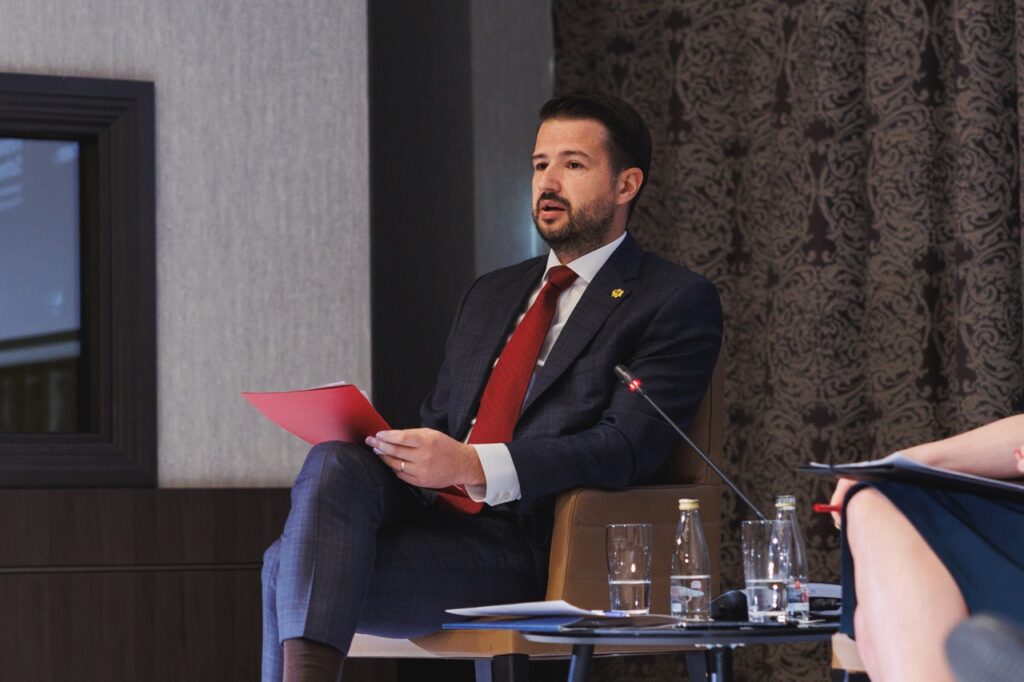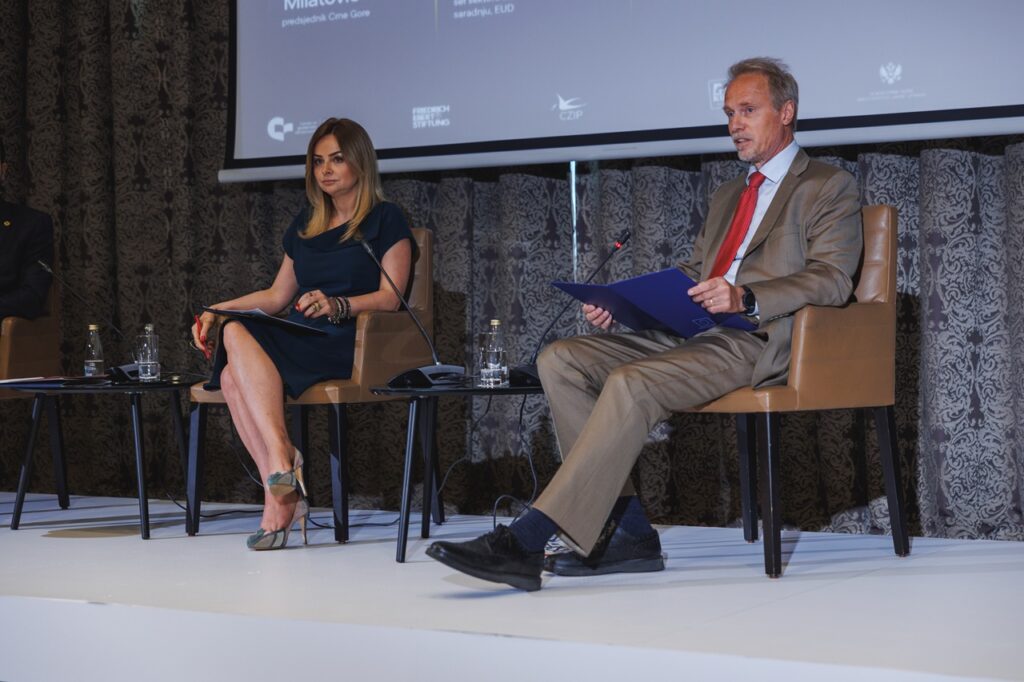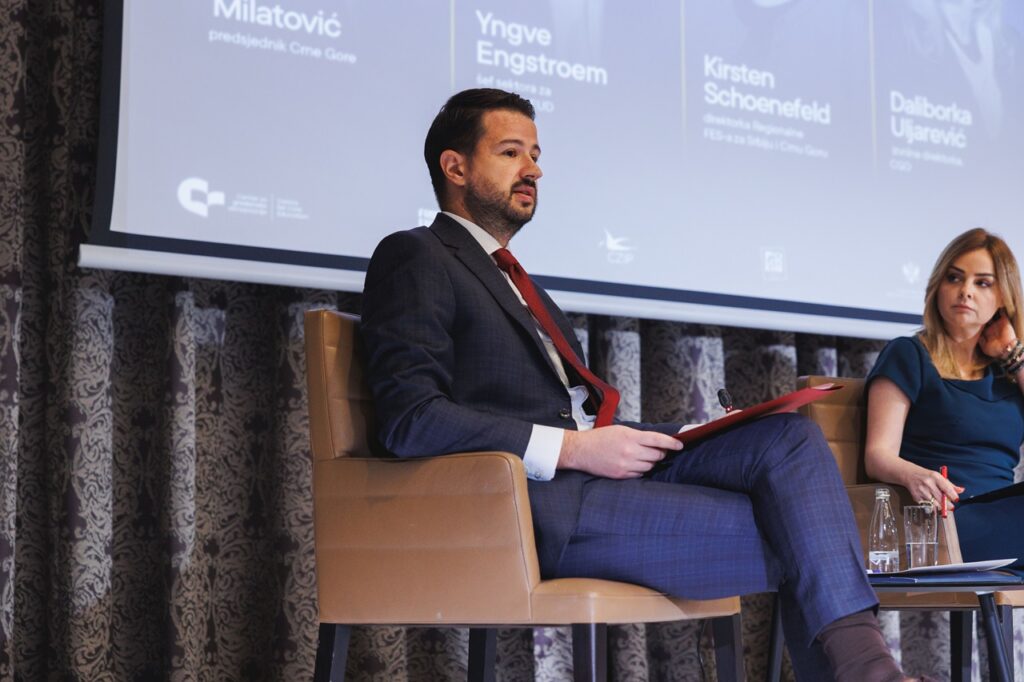The role of the civil sector in the process of European integration is invaluable, and civil society should act as a corrective factor in this process, it was highlighted at the opening of the conference Civil Society’s Journey in Montenegro’s EU Integration, organized by the Centre for Civic Education (CCE) as the conclusion of the project CSOs in Montenegro – From Basic Services to Policy Shaping – M’BASE, supported by the European Union and co-financed by the public administration.
The President of Montenegro, Jakov Milatović, stated that the role of the non-governmental sector is irreplaceable in monitoring and ensuring transparency and accountability. “The role of the civil sector in the European integration process is invaluable, and I believe that civil society should act as a corrective factor in this process. The engagement of the NGO sector is not merely a formality and should not be accepted as such, but as a substantial contribution that strengthens European values in our society,” said Milatović, reminding that he has prioritized cooperation with the civil sector since the beginning of his mandate.
He pointed out that, according to public opinion research, half of Montenegro’s citizens believe that NGOs play an important role in the European integration process, but also that the majority of citizens note that the authorities do not hear the positions of the NGO sector regarding European integration and Montenegro’s commitments. “This clearly indicates the need for greater cooperation and inclusion of civil society in all aspects of this process,” said Milatović.
He stated that Montenegro’s path to the European Union is long and challenging, and the responsibility for the duration of this process in the previous period lies between Podgorica and Brussels. He added that certain progress has been made, and the onset of the war in Ukraine opened a new opportunity for Montenegro and the region. “However, it is not enough to rely on external circumstances; we need to consolidate our efforts and reforms. The concept of an inclusive political majority in Parliament represents a turning point in unblocking European integration, as political consensus for judicial appointments was reached. Although this idea produced positive initial results, I deeply believe that there is now a risk of this initiative turning into its opposite,” noted Milatović.
He stated that two days after receiving a positive Interim Benchmark Assessment Report (IBAR), it is important to understand that this is “the beginning of an intensive reform process, where there is no room for delay and for political dilettantism and bargaining.”
Milatović reminded that he himself had expressed certain reservations towards the current decision-makers regarding transparency, accountability, and sincerity in this process and what is their commitment to essential European values. “Today, due to the actions of those in power, we are witnessing a dissipated hope for reforms. This is because those who, instead of substantive reforms, promise populism, instead of meritocracy emphasize even greater partitocracy, and instead of the rule of law, affirm the right to rule,” Milatović said, adding that these are the key challenges Montenegrin society is facing.
According to him, the reform of the judiciary and anti-corruption legislation must be a priority, and in this, the partnership of the state with the NGO sector is crucial. Reflecting on the security sector, Milatović stated that despite positive steps, the political majority has not managed to achieve full synergy for its final improvement. “If someone thinks that introducing two scripts on police cars is what citizens expect from security sector reform, I think it is completely wrong and beyond citizens’ expectations in the context of better security and justice distribution,” explained Milatović.
Milatović also assessed that media freedom is seriously endangered by political pressures, threats, and attacks on journalists. “Amendments to media laws are the result of political and party trading, in a context where it is evident that certain political actors are experiencing a decline in political legitimacy, which they try to neutralize through biased reporting by the Public Broadcasting Service,” said Milatović, emphasizing that the media must be free to investigate and report.
He noted that public administration suffers from insufficient professionalization and political influence, requiring a much higher degree of transparency and accountability.
Executive Director of CCE, Daliborka Uljarević, said that obtaining IBAR marked a significant milestone, signifying the factual unblocking of the negotiation process. “12 years may be short from a historical perspective, but it is significant for the lives of Montenegro’s citizens who have been living the dream of a Europe for 12 years, where Montenegro will be a society based on functional rule of law, breaking away from nepotism and partisan employment, unscrupulous misuse of public resources, the erosion of the dignity of already fragile institutions, covering up ignorance and inaction at the highest positions with tasteless marketing, ultimately showing an irresponsible attitude towards the public interest and the future,” she said.
She emphasized that this is precisely where the key role of CSOs lies, as a capacitated civil sector ensures a minimum of transparent, inclusive, and democratic path for Montenegro towards membership.
Uljarević stated that this sector has provided valuable insights over the past years, monitored reforms, proposed improvements, consistently advocating for the protection of human rights and the rule of law, both at the strategic and legislative levels, as well as through daily work with those in need of support that the system has not provided.
Uljarević emphasized, noting that oversight of this process and a principled critical stance are expected by citizens.
According to her, only substantial inclusion of CSOs contributes to the credibility and sustainability of reform processes, creating a more resilient and democratic Montenegro ready for EU accession. “Membership in itself is not and should not be the goal – our goal must be a state where all citizens know that the law must be respected, that it applies equally to everyone, where we live with differences and discuss with arguments in the common interest of improving working conditions and opportunities for various categories of society to fully express their potentials,” stressed Uljarević, emphasizing that citizens also expect oversight of this process and a principled critical approach.
Uljarević concluded that the M’BASE project has been one of the pillars of support for the preservation and development of the NGO sector and participation in activities contributing to Montenegro’s path to the EU over the past three and a half years.
Director of the Regional Office of Friedrich Ebert Stiftung for Serbia and Montenegro, Kirsten Schönefeld, pointed out that she believes the M’BASE project is a significant contribution to strengthening the role of local civil society organizations in Montenegro.
“Today’s conference and the project’s conclusion come at a crucial moment for Montenegro and the country’s EU perspective following the positive IBAR recommendations,” said Schönefeld, highlighting that civil society plays an integral role in the development of political culture, and thus in EU integration.
Schönefeld stated that they will continue their cooperation and work in Montenegro to strengthen democracy, the rule of law, and advocate for the country’s EU accession.
She congratulated the Government, citizens, civil society, and political partners on obtaining the IBAR, which, according to her, paves the way for the next steps in the EU accession process. Schönefeld emphasized that the German Federal Government and Bundestag view Montenegro and the developments favourably. “It is very important for us that this development continues in the next stages of accession negotiations so that Montenegro truly becomes a success story for the region, and the European integration of the Western Balkans a reality,” said Schönefeld.
The Head of the Cooperation Sector at the EU Delegation to Montenegro, Yngve Engstroem, congratulated Montenegro on being the first country to successfully complete IBAR. “This is a significant milestone for the country in the EU accession process, but also for EU institutions, as this is the first IBAR in history,” Engstroem emphasized.
He stated that although the EU accession process is led by the state through institutions, the civil sector also has a valuable role in contributing to a more participatory and inclusive process. “An active civil society is a key element of any democratic system. It gives a voice to citizens and creates a link between them and government institutions,” said Engstrom.
He noted that meaningful inclusion of civil society in decision-making processes requires genuine efforts from both the government and civil society. “The government must recognize that CSOs play an important role in connecting the administration with citizens. Meanwhile, CSOs must be proactive, engage in dialogue with the government, and work on improving good governance,” Engstroem emphasized.
According to him, CSOs can help address many societal challenges by engaging in public policy debates, proposing innovative, sustainable, and inclusive solutions, and monitoring the results of reform processes. “They build bridges between the state and communities, which is particularly important at the local level,” Engstroem said.
He noted that the development and functioning of civil society do not end with the country’s EU accession; their activism will still be needed to hold the government accountable and represent diverse communities.
Engstroem stated that they are encouraged to see that the M’BASE project has achieved impressive results in reaching out to a large number of medium and smaller CSOs, especially in the northern and southern parts of Montenegro, noting that this programme has helped many grassroots CSOs that previously did not have access to EU funds to get their first grants and improve the lives of the communities they represent.
Engstroem assured that the EU would continue to provide support to the CSO sector.
The programme “CSOs in Montenegro – from Basic Services to Policy Shapers – M’BASE” is implemented by CCE, in partnership with the Friedrich Ebert Stiftung (FES), NGO Center for Protection and Research of Birds of Montenegro (CZIP), and NGO Politikon Network, in cooperation with the Ministry of Public Administration and the Ministry of European Affairs of the Government of Montenegro. The project is funded by the European Union and co-financed by the Ministry of Public Administration.
MINA




